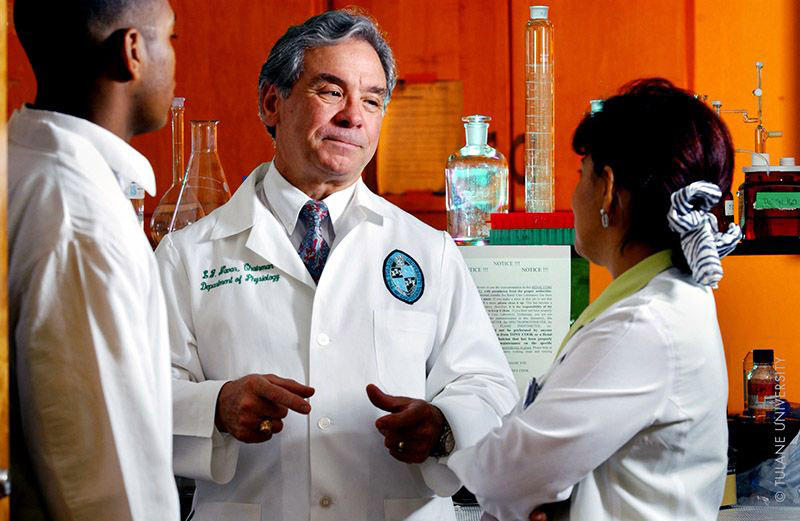
The basic pattern of training in physiology conforms to the regulation of the Graduate Program in Biomedical Sciences, with certain requirements superimposed by the faculty of the Physiology Department. The minimum requirements include 48 hours of formal course work and a personal research program under individual faculty supervision, culminating in a dissertation.
The program leading to the PhD degree is composed of both a “structured” and an “unstructured” portion. The “Structured” portion consists of courses selected from the core curriculum of the Biomedical Sciences Graduate Program, augmented by courses designed specifically for physiology graduate students. This portion of the program serves the dual functions of assuring an adequate understanding of medical training and providing fundamental instruction in physiology and related sciences. The “structured” portion consists of advanced graduate courses and research. It is designed to provide depth and sophistication of knowledge and techniques in the area of individual interest to each other.Read More
Much of the training program is tailored to the individual interests and needs of each student. In particular, the time course for completion of the research program is not rigidly fixed and often requires somewhat more than the minimum four years often outlined. Nevertheless, it is beneficial for the student to aim for these target dates. Faculty evaluation of the student's progress is made at yearly intervals; necessary action is taken at these times to correct any deficiencies and to re-evaluate the student's academic and research needs.
During the first and second years of graduate training, the student should complete the core courses of the Biomedical Sciences Graduate Program and certain advanced physiology courses. It should be noted that graduate students electing to pursue their Ph.D. in the area of physiology are required to take the Human Physiology course in the Spring semester or the Medical Physiology course in the Fall semester of their first year. This course will be taken instead of the Systems Biology core course offered in the spring semester of the first year of study.
To augment the core curriculum, a variety of advanced physiology graduate courses available throughout the entire training period. Again, selection of appropriate courses is made by the student, with approval of the major professor and faculty committee. Three advanced physiology electives are required for the Ph.D. program. The selection should be such as to provide breadth as well as depth of knowledge and experience.
The research rotations consist of exposure to the research methodologies of three research laboratories in physiology and are often related to the student's major area of interest. This rotation is designed to provide increased breadth to the research abilities of students with previous research, or to introduce new researchers to basic concepts in research. Furthermore, this activity serves to introduce students to the research activities of the various faculty members of the Department of Physiology as they begin to select a dissertation advisor. Usually four weeks will be spent in each of three laboratories during the course of the first year. At the end of the first year, students are expected to elect their thesis committee.
The weekly research seminar series of the Department of Physiology constitutes an important component of the training program. The seminar serves as a means of keeping abreast of current research. The parallel Graduate Student Workshop provides an opportunity for the student to gain experience in preparing and presenting research reports. Each student is required to present at least one research seminar each year following successful completion of their preliminary examination. After the preliminary examination, students should start to prepare and present their prospectus to their thesis committee.
The topic for presentation is selected by the student with the approval of the faculty member in charge. Advanced students usually present the results of their own research program. The student is expected to master the subject thoroughly, to present it effectively and critically, and to be able to defend his presentation. Formal evaluation of the student's performance is made by all attending faculty.
It is essential to the realization of our goal that we provide the opportunity for our students to gain experience in teaching. Traditionally, such experience for graduate students has consisted largely of assisting in the medical student laboratory exercises and demonstrations. Advanced graduate students are encouraged to prepare and present lectures and to take part in tutorial sessions and group discussions in the courses offered by the Department of Physiology. Faculty members evaluate the student's performance in these roles and offer advice and direction for improvement as needed.
